- Faculty News
- Student News
- Lab News
- Publications
- Meetings and Presentations
- Outreach
- Grants
- Announcements
- About This Newsletter
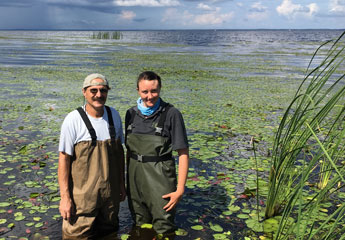
ABOVE: Dr. Jim Cuda and Ms. Megan Reid surrounded by yellow water lilies in Lake George, Volusia Co., FL.
We have the pleasure of introducing our new faculty members to you: Dr. Dorota Porazinska (Gainesville), Dr. Lauren Diepenbrock (Lake Alfred), Dr. Tolulope Agunbiade (Gainesville), Dr. Sriyanka Lahiri (Balm), Dr. Thomas Chouvenc (Ft. Lauderdale), Dr. Eva Buckner (FMEL), Dr. Lindsay Campbell (FMEL), Dr. Rachel Mallinger (Gainesville), and Mr. Cameron Jack (Gainesville).
 Dr. James P. Cuda hosted Ms. Megan Reid, a visiting graduate student from Rhodes University, Grahamstown, South Africa, during the week of 20 August. Megan is conducting research on biological control of yellow waterlily, Nymphaea mexicana. This aquatic plant is native to the southern United States but is highly invasive in South Africa.
Dr. James P. Cuda hosted Ms. Megan Reid, a visiting graduate student from Rhodes University, Grahamstown, South Africa, during the week of 20 August. Megan is conducting research on biological control of yellow waterlily, Nymphaea mexicana. This aquatic plant is native to the southern United States but is highly invasive in South Africa.

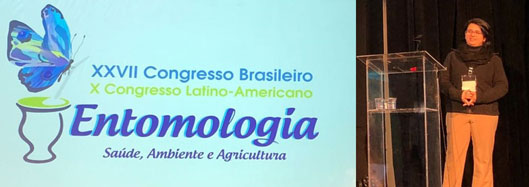
ABOVE: Dr. Paula-Moraes participated in the Brazilian Entomology Meeting. She co-organized, moderated and presented a talk in the round table: Beyond genetics and lethal toxicity: Ecology, behavior, and life history in the evolution of insect resistance to transgenic Bt plants. She is also presented the talk: Isotopic carbon as a way to describe movement of Helicovpera armigera in the savannah landscape.
 Welcome to the family!
Welcome to the family!
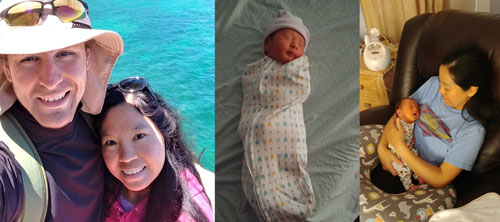
ABOVE: Dr. Weiming Grabau and Dr. Zane Grabau got an early gift as she delivered a baby boy on August 20th. He was about one month early, but both are doing well and are at home now. His name is Zander Xiagu Grabau and he was 5 lb 12 oz when he was born.

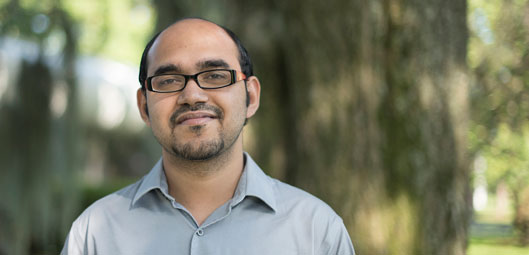
ABOVE: Introduced at the August 31st seminar were the following postdoctoral trainees who joined the department during the course of the previous year: Dr. Rahul Banerjee (Bonning’s lab), who is working on modification of Bt pesticidal proteins for improved toxicity against Hemiptera (above). Dr. Ya Guo (Bonning’s lab), who is working on honey bee viruses, and Dr. Suresh Pannerselvam (Bonning’s lab) who is working on establishment of a new online database and resource for analysis of bacterial pesticidal proteins.
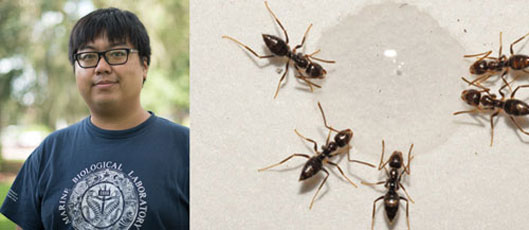
ABOVE: Dr. Miles (Yuanmeng) Zhang is a new postdoc in the Lucky lab. Broadly he is interested in the phylogenetic relationship and drivers of speciation in Hymenoptera. Currently he is using ultraconserved elements (UCEs) to generate genomic level data to: 1) Delimit species complexes within Nylanderia, and 2) Build a time-calibrated phylogeny of Nylanderia. He will also be investigating the utility of UCEs for both deep and shallow phylogenetic inference and assessment of diversification rates/time within Nylanderia. His MSc and Ph.D. both focused on parasitic Hymenoptera, he will also be doing taxonomic and phylogenetics work on the oak/rose gall wasps and their associated parasitoids.
Welcome all of our new 2018 graduate students!
New Gainesville Ph.D. students are: Laurel Lietzenmayer, Clancy Short, Marice Lopez, Balwinder Kaur, Rebeca Sandoval, Sarah Maestas, Yuexun Tian, Sarah Anderson, and Xiao Lai.
Ph.D. students joining us at the Research and Education Centers are: Abdullah Alomar, Xiaodi Wang, Kristin Sloyer, Emilie Demard, Kelly Carruthers, Austin Fife, Nicholas Johnston, and Octavio Menocal.
Joining us as joint UF-FAMU Ph.D. students are Alex Orfinger and Worrel Diedrick.
Our new Gainesville MS students are James Weaver, Lindsay Wheeler, Krystal Ashman, Sarah Steele Cabrerea, Emily Noordyke, Rebecca Perry, Matthew Pileggi, Cleveland Ivey, Eyad Shuker, Andrew Branch, Sean McKay, Jacob Mellick, and Riley Gott.
The new MS students who are co-enrolled in the Doctor of Plant Medicine Program are: Clayton Bania and Matthew Borden.
New MS students starting at the Research and Education Centers are David Moreira, Jackie Coburn, Gabriella Steele, Anne Mills, Lidia Komondy, Alessandra Humphries, Matthew Miller, and Victoria Adeleye.
New online MS students are: Larry Stretz, Casey Federovitch, Caitlin Gill, Elizabeth Braatz, Lincoln Wells, Autumn Angelus, and Kaydie McCormick.
We are pleased to welcome everyone!
 At the national American Chemical Society meeting in Boston, Dr. Liu Yang (Bloomquist lab) was acknowledged for her talk (“Vapor phase repellents/insecticides: New methods, chemistry, and mechanism of action”) with the Young Scientist Award for 2018, given by the American Chemical Society, Division of Agrochemicals. The award is a plaque and $1000 in travel funds. At this same meeting, Mr. Shiyao Jiang (Ph.D. student in the Bloomquist lab) was awarded a $200 second prize in the student poster competition “High-throughput screening apparatus for evaluating spatial repellency and vapor toxicity of commercially available and candidate repellent compounds”, as well as a travel award of $840 from Bayer Crop Science.
At the national American Chemical Society meeting in Boston, Dr. Liu Yang (Bloomquist lab) was acknowledged for her talk (“Vapor phase repellents/insecticides: New methods, chemistry, and mechanism of action”) with the Young Scientist Award for 2018, given by the American Chemical Society, Division of Agrochemicals. The award is a plaque and $1000 in travel funds. At this same meeting, Mr. Shiyao Jiang (Ph.D. student in the Bloomquist lab) was awarded a $200 second prize in the student poster competition “High-throughput screening apparatus for evaluating spatial repellency and vapor toxicity of commercially available and candidate repellent compounds”, as well as a travel award of $840 from Bayer Crop Science.
 Oliver Keller was invited to a pig roast organized by University of Florida President Dr. Kent Fuchs and the UF social media team. The event was held on Saturday, September 8th at the Earl and Christy Powell University House. A diverse mix of faculty, staff, and students who regularly and actively promote the university on Twitter were invited to be honored for their engagement.
Oliver Keller was invited to a pig roast organized by University of Florida President Dr. Kent Fuchs and the UF social media team. The event was held on Saturday, September 8th at the Earl and Christy Powell University House. A diverse mix of faculty, staff, and students who regularly and actively promote the university on Twitter were invited to be honored for their engagement.
 From August 20th to September 1st, Jason Williams (a Ph.D. candidate in the Lucky lab) spent two weeks in French Guianan primary rainforest to attend Ant Course 2018, which was held at the Nouragues Research Station inselberg camp. This course is designed for students of myrmecology and covers topics including taxonomy, systematics, morphology, ecology, and field collecting techniques of ants. As part of the course, students collect, curate, and identify specimens, manage collection data, and collaborate on group field projects.
From August 20th to September 1st, Jason Williams (a Ph.D. candidate in the Lucky lab) spent two weeks in French Guianan primary rainforest to attend Ant Course 2018, which was held at the Nouragues Research Station inselberg camp. This course is designed for students of myrmecology and covers topics including taxonomy, systematics, morphology, ecology, and field collecting techniques of ants. As part of the course, students collect, curate, and identify specimens, manage collection data, and collaborate on group field projects.
Jason and 16 other international students were given this exceptional opportunity by Brian Fisher of the California Academy of Sciences. The 17 students who attended were chosen from a pool of 80 applicants from 32 different countries. Countries represented by students and instructors of the course included the United States, Canada, Brazil, France, Germany, Singapore, Japan, and Australia. All graduates of the course received an Ant Course diploma, hand-signed by the father of sociobiology himself, E.O. Wilson.
 We recently finished awarding CALS scholarships for 2018-19. In total, the CALS Dean's office awarded $574,875 in scholarships and fellowships to 334 undergraduate students and 86 graduate students. Listed below are the students from our program who were selected for scholarship or fellowship awards.
We recently finished awarding CALS scholarships for 2018-19. In total, the CALS Dean's office awarded $574,875 in scholarships and fellowships to 334 undergraduate students and 86 graduate students. Listed below are the students from our program who were selected for scholarship or fellowship awards.
Entomology and Nematology – Graduate Winners
- A.S. Herlong, Sr. Scholarship Fund, $2,000 Bethany McGregor and $2,000 Casey Parker
- Brelan E. Moritz Scholarship, $1,000 Johnalyn Gordon
- Florida Fertilizer and Agrichemical Association Scholarship, $2,000 Cory Penca
- William C. and Bertha M. Cornett Fellowship, $1,500 Octavio Menocal Sandoval, $1,500 De-Fen Mou, and $1,500 Kristin Sloyer
Entomology and Nematology – Undergraduate Winners
- Alto and Patrecia Straughn Scholarship, $1,000 Madison Cook
- CALS Alumni and Friends Scholarship, $1,000 Tanner Felbinger
- John H. G. Hutchinson Scholarship, $1,000 Amber Hanna
- Florida Rural Rehabilitation Corporation Scholarship, $1,000 Johanna Schwartz
- Coca-Cola Scholarship, $1,000 Kaleela Thompson
Need to name that bug? A host of experts are available to help Floridians identify any insect or related arthropod. If a mystery creature has six or more legs, the UF Insect ID Lab is the place to call.
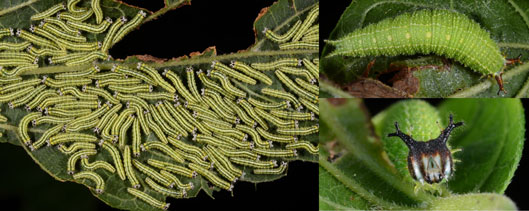
ABOVE: Lyle Buss was recently examining a young hackberry tree for insects. The easiest bugs to find on hackberry are usually the Asian woolly hackberry aphids, so he was happy to find caterpillars of two butterfly species. Young tawny emperor caterpillars are gregarious, and a couple leaves were totally covered with 3rd instars. On a different branch was a caterpillar of the hackberry emperor (4th instar?). This species is a solitary feeder. Both species have spiny processes on their heads; the close-up here shows the head of the hackberry emperor.
Need insect images? You can go to this direct link, pictures are copyrighted material and intended for official UF use only, log onto the website using your Gatorlink credentials.
Lyle Buss is the UF/IFAS Insect ID Lab manager.
 Think it might be a nematode problem? The Nematode Assay Laboratory serves Florida and other states by providing nematode assays and expert advice regarding nematode management.
Think it might be a nematode problem? The Nematode Assay Laboratory serves Florida and other states by providing nematode assays and expert advice regarding nematode management.
For more information on the Nematode Assay Laboratory, please contact the lab manager Dr. Billy Crow.
Chow A, Dunlap CA, Jackson MA, Avery PB, Patt JM, Sétamou M. 2018. Field efficacy of autodissemination and foliar sprays of an entomopathogenic fungus, Isaria fumosorosea (Hypocreales: Cordycipitaceae), for control of Asian citrus psyllid, Diaphorina citri (Hemiptera: Liviidae), on residential citrus. Journal of Economic Entomology DOI: 10.1093/jee/toy216.
Cicero JM, Alba-Tercedor J, Hunter WB, Cano LM, Saha S, Mueller LA, Brown SJ. 2018. Asian citrus psyllid stylet morphology and applicability to the model for inter-instar stylet replacement in the potato psyllid. Arthropod Structure and Development DOI: 10.1016/j.asd.2018.06.007.
Cicero JM, Alba-Tercedor J, Hunter WB, Saha S, Mueller LA, Brown SJ. 2018. An animated correspondence of Asian citrus psyllid stylets to the model for biogenesis of potato psyllid stylets. Developing an infrastructure and product test pipeline to deliver novel therapies for citrus greening disease. https://citrusgreening.org.
Cicero JM, Hunter WB, Cano LM, Saha S, Mueller LA, Brown SJ. 2018. An animated detailing of the alimentary canal of the Asian citrus psyllid, with special reference to the configuration and function of the filter chamber. Developing an infrastructure and product test pipeline to deliver novel therapies for citrus greening disease. https://citrusgreening.org.
Gillett-Kaufman JL. 2018. Featured Creatures: Something for everyone. Pest Pro Magazine. September/October: Pages 27 and 31.
Keller O, Branham MA. 2018. Miscellaneous notes on the fireflies (Coleoptera: Lampyridae) in McDermott’s 1966 catalogue of Lampyridae. Insecta Mundi 0656: 1-10.
Kemmerer M, Bonning BC. 2018. Transcytosis of Junonia coenia densovirus VP4 across the gut epithelium of Spodoptera frugiperda (Lepidoptera: Noctuidae). Insect Science DOI: 10.1111/1744-7917.12600.
Leavell BC, Rubin JR, McClure CJW, Miner KA, Branham MA, Barber JR. 2018. Fireflies defuse bat attack with multisensory warnings. Science Advances. DOI: 10.1126/sciadv.aat6601.
This paper was featured in several popular press articles, here are two examples:
http://news.ufl.edu/articles/2018/08/did-bats-invent-fireflies.php
Lomate PR, Bonning BC. 2018. Proteases and nucleases involved in the biphasic digestion process of the brown marmorated stink bug, Halyomorpha halys (Hemiptera: Pentatomidae). Arch Insect Biochem Physiol 98(3):e21459 DOI: 10.1002/arch.21459.
McGregor BL, Stenn T, Sayler KA, Blosser EM, Blackburn JK, Wisely SM, Burkett-Cadena ND. 2018. Host use patterns of Culicoides spp. biting midges at a big game preserve in Florida, U.S.A., and implications for the transmission of orbiviruses. Medical and Veterinary Entomology DOI: 10.1111/mve.12331.
Meki IK, İnce İA, Kariithi HM, Boucias DG, Ozcan O, Parker AG, Vlak JM, van Oers MM, Abd-Alla AMM. 2018. Expression profile of Glossina pallidipes MicroRNAs during symptomatic and asymptomatic infection with Glossina pallidipes salivary gland hypertrophy virus (Hytrosavirus). Frontiers in Microbiology 03 September 2018 https://doi.org/10.3389/fmicb.2018.02037.
Reeves LE, Gillett-Kaufman JL, Kawahara AY, Kaufman PE. 2018. Barcoding blood meals: New vertebrate-specific cytochrome c oxidase subunit I (COI) primer sets for assigning taxonomic identities to the blood meals of Florida mosquitoes. PLOS Neglected Tropical Diseases. 12(8): e0006767. https://doi.org/10.1371/journal.pntd.0006767.
Sahayaraj K, Kumar V, Banu SN, Avery PB, Radhika SA, McKenzie CL, Osborne LS. 2018. Predation potential of Rhynocoris marginatus (Hemiptera: Reduviidae) against three mealybug species of agricultural importance. Applied Entomology and Zoology DOI: org/10.1007/s13355-018-0576-6.
Sahayaraj K, Subash N, Allingham R, Kumar V, Avery PB, Mehra L, McKenzie CL, Osborne LS. 2018. Lethal and sub-lethal effects of three microbial biocontrol agents on Spodoptera litura and its natural predator Rhynocoris kumarii. Insects 9, 101; DOI: 10.3390/insects9030101.
Stenn T, Peck KJ, Rocha Pereira G, Burkett-Cadena ND. 2018. Vertebrate hosts of Aedes aegypti, Aedes albopictus, and Culex quinquefasciatus (Diptera: Culicidae) as potential vectors of Zika virus in Florida. Journal of Medical Entomology. tjy148, https://doi.org/10.1093/jme/tjy148.
Uysal AK, Martin LB, Burkett-Cadena ND, Barron DG, Shimizu T. 2018. Simulated viral infection in early-life alters brain morphology, activity and behavior in zebra finches (Taeniopygia guttata). Physiology & Behavior. https://doi.org/10.1016/j.physbeh.2018.08.004.
Weeks ENI, Baniszewski J, Gezan SA, Allan SA, Cuda JP, Stevens BR. 2018. Methionine as a safe and effective novel biorational mosquito larvicide. Pest Management Science DOI: 10.1002/PS.5118.
 New on Featured Creatures:
New on Featured Creatures:
Asian chestnut gall wasp, Dryocosmus kuriphilus Yasumatsu. Authors: Emilie P. Demard and Ronald D. Cave, Indian River Research and Education Center, Department of Entomology and Nematology, University of Florida.
Hemlock woolly adelgid, Adelges tsugae (Annand 1928). Authors: Jeremiah R. Foley, Virginia Polytechnic Institute and State University, Scott Salom, Virginia Polytechnic Institute and State University, and Carey Minteer, University of Florida.
Spotted lanternfly, Lycorma delicatula (White). Authors: Taryn B. Griffith and Jennifer L. Gillett-Kaufman, University of Florida.
Do you have a favorite creature? Learn how to make it into a Featured Creatures!
Biological Control and IPM Workshop in Guayaquil, Ecuador
Dr. Amanda Hodges and Dr. Hugh Smith collaborated on a workshop focused on biological control and integrated pest management techniques with recently graduated Doctor of Plant Medicine student Lisbeth Espinoza. Dr. Espinoza is a newly appointed professor at an Ecuadorian university, La Escuela Superior Politécnica del Litoral (ESPOL). Seventeen Ecuadorian professionals and students attended the week-long workshop that included topics on insect diagnostics, trapping techniques, rearing procedures for biological control, pesticide thresholds, and information on scouting and monitoring. Dr. Espinoza hopes to continue this program and develop more entomology and crop protection courses to be offered in her teaching program.
 ABOVE: Plant biosecurity fellows Morgan Pinkerton and Sage Thompson developed activities and delivered presentations at the workshop. They also had the opportunity to see some pests of concern for Florida in the field, such as the tomato pinworm Tuta absoluta.
ABOVE: Plant biosecurity fellows Morgan Pinkerton and Sage Thompson developed activities and delivered presentations at the workshop. They also had the opportunity to see some pests of concern for Florida in the field, such as the tomato pinworm Tuta absoluta.
![]()
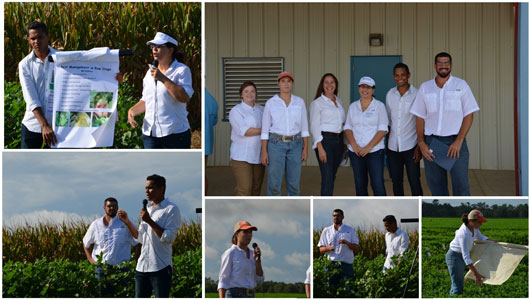
ABOVE: On August 10th the entomology team participated in the 2018 Extension Farm Field Day. Dr. Paula-Moraes presented information about pest management in row crops and Bt technology in cotton. Following her presentation, Marcelo Mendes (a visiting researcher from Brazil) and Chris Hemphill (undergrad student from Plant Science) demonstrated how to sample cotton fields and inspect plants for the presence of pests. Jessica Baldwin (entomology master student) discussed with farmers the use of the beat cloth to detect the presence of larvae of lepidopterans in peanut fields.
![]() Dr. Suresh Pannerselvam, postdoctoral research associate in Bryony Bonning’s lab presented a poster entitled “Development of a bacterial pesticidal protein resource center” the annual meeting of the Society for Invertebrate Pathology, held in Gold Coast, Australia.
Dr. Suresh Pannerselvam, postdoctoral research associate in Bryony Bonning’s lab presented a poster entitled “Development of a bacterial pesticidal protein resource center” the annual meeting of the Society for Invertebrate Pathology, held in Gold Coast, Australia.
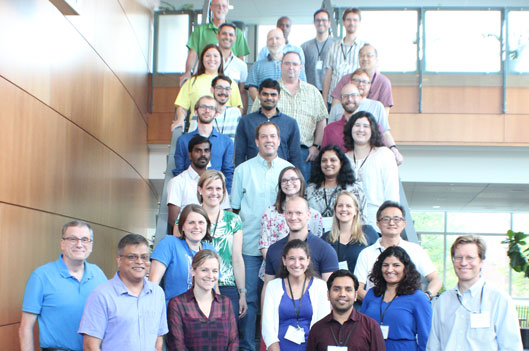
ABOVE: Dr. Pavan Kumar, postdoctoral research associate in Bryony Bonning’s lab took part in the Insect Genetic Technologies Research Coordination Network 2018 Technical Short Course on “Insect Genetic Technologies: Theory and Practice”, held at University of Maryland.
Dr. Bryony Bonning gave an invited presentation on “The Insect Virome” at the 11th Arthropod Genomics Symposium, held at University of Illinois in Urbana-Champaign.
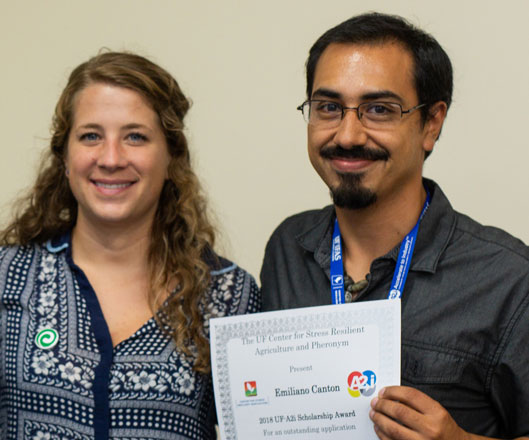
ABOVE: Emiliano Canton with Abigail Perret-Gentil, with Emiliano's Pheronym Award. Drs. Rahul Banerjee, Emiliano Canton, Biviana Flores-Escobar, Pavan Kumar, Suyog Kuwar, Suresh Pannerselvam and Ruchir Mishra attended the UF IFAS “A2I Symposium: Accelerate to Industry”, which provides a unique professional development opportunity provided by industry employers. This annual 3-day event is open to both graduate students and postdoctoral researchers. Dr. Emiliano Canton was awarded an Outstanding Application Scholarship by Pheronym during the course of this event.
![]() Members of the Burkett-Cadena laboratory (Bethany McGregor, Agustin Quaglia, Kristin Sloyer, Dinesh Erram and Nathan Burkett-Cadena) attended the 67th Annual International Conference of the Wildlife Disease Association, August 5th to 10th, in St. Augustine, FL.
Members of the Burkett-Cadena laboratory (Bethany McGregor, Agustin Quaglia, Kristin Sloyer, Dinesh Erram and Nathan Burkett-Cadena) attended the 67th Annual International Conference of the Wildlife Disease Association, August 5th to 10th, in St. Augustine, FL.
![]() Dr. Carey Minteer attended the International Symposium on Biological Control of Weeds in Engelberg, Switzerland August 26-31. Dr. Minteer gave a presentation titled “Charismatic microfauna: using Lilioceris cheni to increase public perception and acceptance of the biological control of weeds”.
Dr. Carey Minteer attended the International Symposium on Biological Control of Weeds in Engelberg, Switzerland August 26-31. Dr. Minteer gave a presentation titled “Charismatic microfauna: using Lilioceris cheni to increase public perception and acceptance of the biological control of weeds”.
Ph.D. student Patricia Prade attended the International Symposium on Biological Control of Weeds in Engelberg, Switzerland August 26-31. Patricia gave a presentation titled “Brazilian peppertree in Florida, USA: Research updates on potential biological control agents.” Patricia also presented Dr. Cuda’s poster titled, “Performance of the gall midge Orseolia javanica (Diptera: Cecidomyiidae) on two Florida biotypes of cogongrass, Imperata cylindrica.” Patricia is working in Dr. Carey Minteer’s lab and is supervised by both Dr. Minteer and Dr. Jim Cuda.
![]() Dr. James P. Cuda was an invited speaker for the In Service Training workshop, “Tree Health and Invasive Species in Times of Change” held at the Austin Carey Learning Center, 14-16 August. Cuda gave a presentation titled, “Prospects for Biological control of Cogongrass” The presentation was co-authored by Dr. William Overholt. Approximately 50 individuals representing private industry, county extension, St. John’s River WMD, the Nature Conservancy, and federal agencies participated in the 3-day training event.
Dr. James P. Cuda was an invited speaker for the In Service Training workshop, “Tree Health and Invasive Species in Times of Change” held at the Austin Carey Learning Center, 14-16 August. Cuda gave a presentation titled, “Prospects for Biological control of Cogongrass” The presentation was co-authored by Dr. William Overholt. Approximately 50 individuals representing private industry, county extension, St. John’s River WMD, the Nature Conservancy, and federal agencies participated in the 3-day training event.
![]()
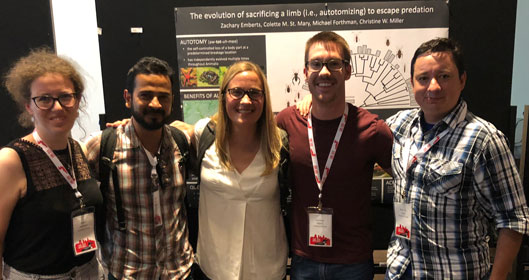
ABOVE: Five members of the Miller Lab (from left to right, Dr. Ginny Greenway, Dr. Ummat Somjee, Dr. Christine Miller, Zachary Emberts, and Dr. Pablo Allen) recently traveled to Minneapolis, Minnesota to present their research at the 2018 International Society for Behavioral Ecology conference. Zachary presented a poster on the evolution of sacrificing limbs to escape predation. Dr. Miller presented on resource allocation tradeoffs found in weapons and testes, as well as the female homologous traits. Dr. Allen talked about phenotypic plasticity and population level differences of beak length in a cactus feeding bug. Dr. Greenway presented on male reproductive allocation in response to partner traits. And lastly, Dr. Somjee gave a talk on the metabolic cost of maintaining a sexually selected weapon.
Dr. Ummat Somjee, a recent Ph.D. graduate from Dr. Christine Miller’s lab, presented part of his dissertation work at the 2018 Animal Behavior Society conference. His talk was titled, “The hidden costs of a sexually selected weapon.”
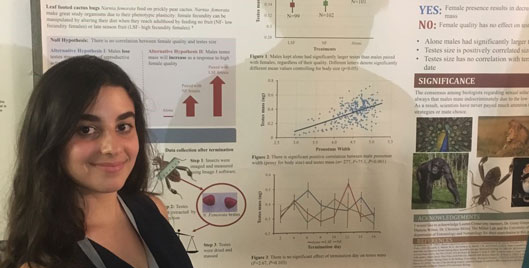
ABOVE: Daniela Gomez, an undergraduate researcher in Dr. Christine Miller’s lab, was awarded the Turner Award from the Animal Behavior Society (ABS). This prestigious award provides support to travel to the annual conference and offers recipients the opportunity to attend a one-day workshop that integrates them into the ABS community. While there, Daniela also presented a poster on her research, which investigates whether male testes size is affected by the presence and quality of a female.
From the Outreach Coordinator
The live critters are always a hit with children and adults alike. The critters are available for you to check out should you be leading an outreach event. We have doubles of our most popular critters, as well as various native insect species depending on the time of year. We have large wood and Plexiglas cages for viewing our native orb weaving spiders. There is one travel cage and one larger static cage. Please be sure to contact us and review the protocol on transporting and handling the critters if you are not already familiar with it. If you lead an outreach, be sure to fill out a documentation form so your event can be included in the newsletter and we can log all outreach events.
If you have any questions, please email me.
Thank you — Laurel Lietzenmayer, Outreach Coordinator.
If you would like to schedule an event or have any outreach questions, go to the Outreach pages on our Bug Club website and contact us.
Getting social!
We have several social media sites for the Entomology & Nematology Department. To make them easily searchable, all three (YouTube, Facebook and Twitter) have the same page name: UFEntomology. Please share these links with past students or colleagues who may have an interest in departmental activities.
Dr. Jeff Bloomquist has a new 3-year, $900,000 grant coming on-line: “Novel Spatial Repellents and Insecticides to Circumvent Pyrethroid Resistance” from the Deployed War Fighter Research Program.
![]() Gabrielle LaTora, a master’s student in the Liburd Small Fruit and Vegetable IPM Lab, received $16,300 in funding for her Southern Region SARE graduate student grant proposal titled “Innovations in spotted wing drosophila (Drosophila suzukii Matsumura) monitoring and attract-and-kill for development of more targeted IPM programs.”
Gabrielle LaTora, a master’s student in the Liburd Small Fruit and Vegetable IPM Lab, received $16,300 in funding for her Southern Region SARE graduate student grant proposal titled “Innovations in spotted wing drosophila (Drosophila suzukii Matsumura) monitoring and attract-and-kill for development of more targeted IPM programs.”
![]() Iris Strzyzewski (a Ph.D. student with Dr. Xavier Martini) was awarded a $10,316 grant from the Southern SARE Graduate Student Grant program to develop an attract and reward strategy to control thrips and whiteflies in Florida tomato.
Iris Strzyzewski (a Ph.D. student with Dr. Xavier Martini) was awarded a $10,316 grant from the Southern SARE Graduate Student Grant program to develop an attract and reward strategy to control thrips and whiteflies in Florida tomato.
![]() Patricia Prade, a doctoral student of Dr. James P. Cuda and Dr. Carey R. Minteer, was awarded a $9,000 grant from the FWC mini-grant program to support her research on biological control of Brazilian peppertree.
Patricia Prade, a doctoral student of Dr. James P. Cuda and Dr. Carey R. Minteer, was awarded a $9,000 grant from the FWC mini-grant program to support her research on biological control of Brazilian peppertree.
![]() Want grant writing tips? Check out the UF Libraries Grants Management Program!
Want grant writing tips? Check out the UF Libraries Grants Management Program!
Library Corner
Sept 10-15: Peer Review Week: diversity in peer review. This is a national event and Marston is hosting a daily session.
Event: Peer Review & You: An introduction!
Monday September 10, 11:45 am to 12:35 pm
Marston Science Library L136
Speaker: Suzanne Stapleton & Michelle Leonard
Description: Peer review is a critical part of scholarly journals. Peer review is a foundation to the advancement of science. Come learn what exactly is peer review and how to recognize articles that have been peer reviewed. Learn about blind, double-blind, and open forms of peer review. Bring a friend, and bring your lunch! Snacks provided.
Event: Peer Review: Writing a review: The good, bad, & ugly
Tuesday September 11, 1:55 am to 2:45 pm
Marston Science Library L136
Speaker: Marc Branham, Ph.D, Entomology & Nematology Department
Description: Join us for an interactive session on what it means to be a peer reviewer from an editor's perspective. Develop your own peer review criteria, learn how to write a great review so you will be invited to back by editors, and discover what not to do when writing a review. Bring a friend, and bring your lunch! Snacks provided.
Event: Navigating the peer review process as an author
Wednesday September 12, 1:55-2:45
Marston Science Library, L136
Speaker: Dave Schwieder, Ph.D.
Description: Join us for an interactive session on effectively navigating the peer review process as a manuscript author. Learn how to effectively work with editors, interpret reviews, and respond to comments and concerns raised by reviewers. Snacks provided.
Event: Become a peer reviewer for the UF Journal of Undergraduate Research (graduate students)
Thursday September 13, 11:45 am to 12:35 pm
Marston Science Library L136
Speakers: Michelle Leonard & Anne Donnelly
Description: Did you know that the UF Center for Undergraduate Research publishes a double-blind peer review scholarly journal on a quarterly basis? We are recruiting graduate students from all disciplines to become a peer reviewer. In this session, you will hear from current reviewers, and learn how to become a peer reviewer for this journal. Topics include the overall process, editor expectations, peer reviewer requirements and more! Bring a friend and your lunch! Snacks provided.
Event: Publons: Showcasing your peer review
Friday September 14, noon to 1:30 pm
Marston Science Library L136
Panelists: UF faculty, and Nick Mitchell, Ph.D, Solutions Specialist on Customer Success Team, Clarivate Analytics
Description: Publons is a free network of scholars designed to showcase their contributions as peer reviewers. Come learn more about how Publons verifies peer reviews for greater recognition of the merits of peer review. Dr. Nick Mitchell, Solutions Specialist from Clarivate Analytics will provide an orientation to Publons. A panel of UF faculty will share their perspectives on being a peer reviewer and how they use Publons.
Event: Introduction to EndNote Web
Thursday September 20, 11:45-12:35pm
Marston Science Library, room 308
Presenter: Melody Royster
Description: Working on a research paper? You can use EndNote to manage citations of published literature on your research topic. EndNote Web is a free citation management tool that can help you organize and share references for your research and reports. In this hands-on workshop you will learn how to add references and format a bibliography. Take an hour to improve your own research skills by attending this workshop.
Discover all the Entomology resources available from the UF Libraries: http://guides.uflib.ufl.edu/entomology
Submitted by: Michelle Leonard
Marston Science Library, University of Florida
mleonard@uflib.ufl.edu; 352-273-2866 (ph)
orcid.org/0000-0002-9017-3591
![]() Want to stay up to date? Check out our website home page for a link to our Google calendar.
Want to stay up to date? Check out our website home page for a link to our Google calendar.
![]() UF Peace Corps Campus Recruiter Available for Classroom Visits and One-on-one Consultations
UF Peace Corps Campus Recruiter Available for Classroom Visits and One-on-one Consultations
Do you know students who may be interested in joining the Peace Corps? UF's Peace Corps campus recruiter, Breton Homewood, is available for classroom visits and one-on-one consultations with potential applicants. He can provide information about Peace Corps countries and programs, guide students through the application process, and conduct mock interviews, among other services. Contact Breton by email (peacecorps@ufic.ufl.edu) or phone (352-294-2267), or visit him in Office #170 in the International Center in the HUB during his office hours (Tuesdays 10:00AM-noon or by appointment). Breton served in the Peace Corps in Paraguay from 2012-2016 as an agriculture extension volunteer.
Dr. Jennifer Gillett-Kaufman is the newsletter editor and does the HTML coding. Issues usually are published by mid-month. Submit items for an issue by the seventh of that month.
We like to share news when it happens using our social media outlets: Twitter, Facebook and YouTube. Follow us on these sites for daily updates! When you send news, we will post it on one or more of these sites and again in the monthly newsletter. Please be sure you have permission from people in photographs you submit for publication.
UF-Bugnews-L listserv subscribers receive notices when issues are posted. Our home page has instructions for subscribing and unsubscribing.
Special thanks to Haleigh Ray and Nancy Sanders, who reviewed the newsletter for errors, and to Jane Medley and Don Wasik, who built the web page design.
Give Back
Want to support the UF Entomology & Nematology Department? Consider making an online gift today! Questions can be directed to Christy Chiarelli at (352) 392-1975 or ccw@ufl.edu.